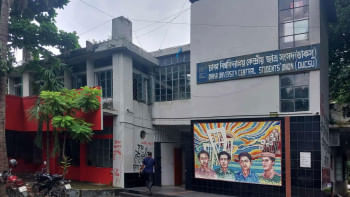Inflation creeps up on rice price hike
Inflation accelerated for the second consecutive month in September thanks to the rise in food prices backed by the staple rice.
Last month, inflation stood at 6.12 percent, up 23 basis points from August, according to data from the Bangladesh Bureau of Statistics.
Planning Minister AHM Mustafa Kamal yesterday released the inflation data of the last two months but did not give a breakdown of food and non-food inflation -- both of which were departures from previous practice.
On May 16, Kamal had announced that the government will make public the Consumer Price Index data on a quarterly basis instead of the global standard practice of monthly reporting -- a move that gave rise to an air of suspense surrounding the release of inflation statistics.
True to his word, his next release of inflation data, which came in July, was on a quarterly basis -- for the April-June quarter -- but he went back to monthly reporting the following month, disclosing the figure for July.
Inflation declined for the first time in eight months in July: it stood at 5.57 percent, 0.3 percentage point lower than the previous month.
In September, there was radio silence from both the planning minister and the BBS on inflation figures. Yesterday, he disclosed two months' numbers at once.
Kamal said inflation will come down gradually from next month. “Inflation rose slightly as rice production was hampered due to heavy rainfall and floods. People had apprehended that there would be a price spiral but that did not happen.”
By the end of the year, inflation will get back to within the target, he added.
Many analysts said the chaotic inflation reporting comes from the government's wish to mask the rising prices of rice, a staple food item in Bangladesh and thereby plays an important role in determining inflation.
In recent months, rice prices rose to record highs, reflecting the dwindling supplies following flood-induced losses to the main boro crop in 2017 coupled with reduced production and imports in 2016.
About 20 lakh tonnes of boro crop have been damaged, according to the food ministry.
Yesterday, coarse rice price went up 24.32 percent from a year earlier to Tk 44-48 a kg, according to data from the Trading Corporation of Bangladesh, which tracks the prices of several items in Dhaka city.
The prices of all other varieties of the staple went up between 22 percent and 29 percent in the last one year.
In the latest monetary policy unveiled in July, the central bank said the food price uptrend caused by the flash flood in the last quarter of fiscal 2016-17 in the haor regions poses risks of inflation. The fiscal 2017-18's monetary programme of the central bank seeks to set a prudent, flexible course towards containing the 12-month average CPI inflation within 5.5 percent.
Inflation is expected to be above 6 percent in June 2018, according to the BB's latest inflation expectation survey. The central bank's projection shows the average annual inflation for the first half of the fiscal year would be 5.5-5.9 percent.
“Looking ahead, given the domestic inflation dynamics, food price developments and tapering base effects, some price pressures may emerge during fiscal 2017-18 and will need to be monitored and contained carefully,” said the monetary policy statement of the BB.

 For all latest news, follow The Daily Star's Google News channel.
For all latest news, follow The Daily Star's Google News channel. 



Comments